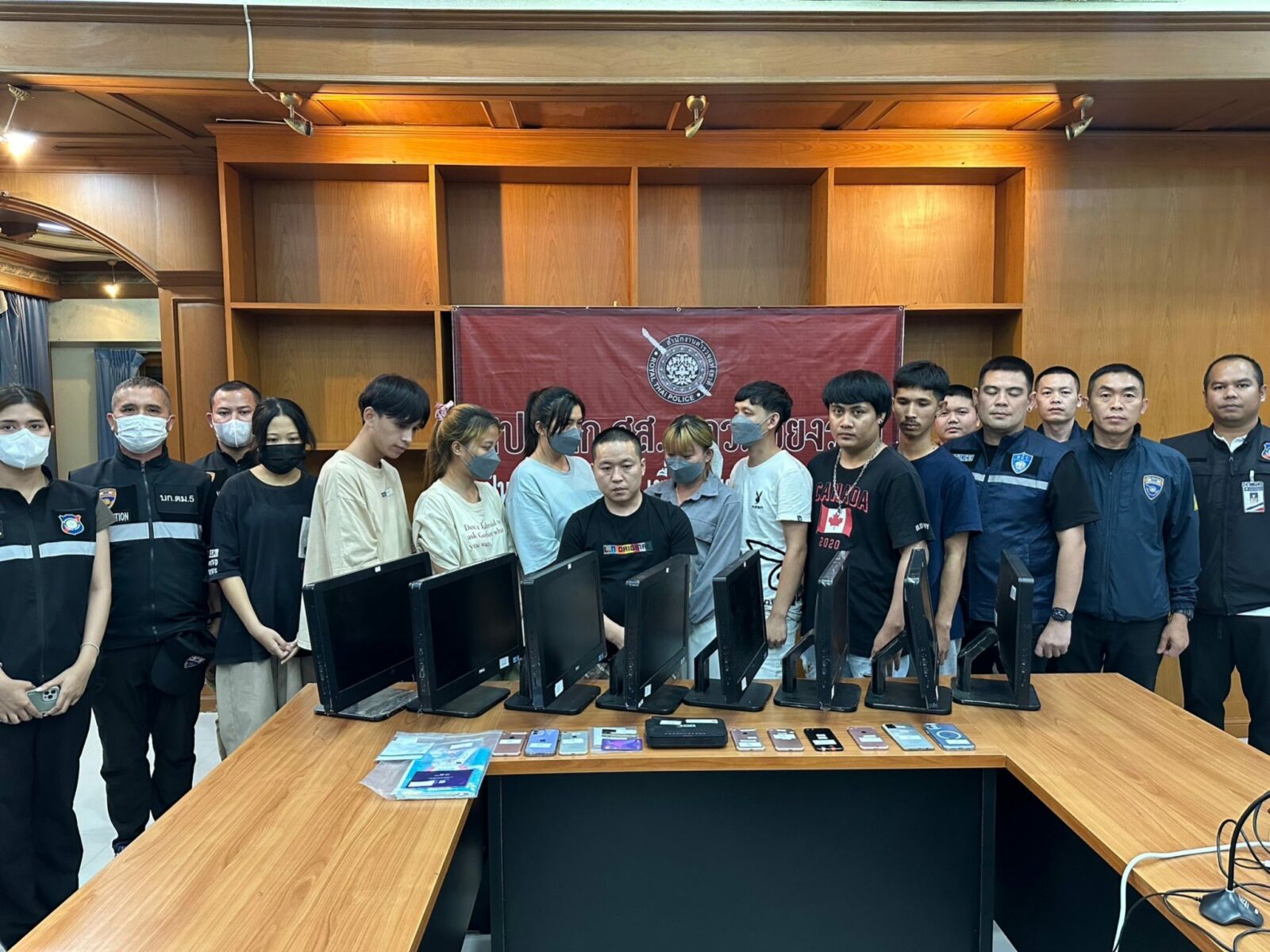- Joined
- Feb 26, 2019
- Messages
- 12,449
- Points
- 113
Chinese national and 12 accomplices arrested for online scam in Chiang Rai
thethaiger.com
Facebook Twitter LinkedIn Messenger Messenger WhatsApp Line Share via Email Print
 Picture courtesy of Chiang Rai Times.
Picture courtesy of Chiang Rai Times.
A Chinese national and 12 accomplices have been apprehended in Chiang Rai for their involvement in an online scam operation. The arrests were made by officers from Provincial Police Region 5 and the Immigration Bureau, following a tip-off about the gang’s activities in Chiang Rai City.
The police, armed with a search warrant issued by Chiang Rai Provincial Court, collaborated with immigration officials to raid a commercial building in tambon Rob Wiang, Mueang district. They found the gang actively scamming victims online and arrested Chu Huaixiang, the Chinese national identified as the gang leader, along with 12 team members, consisting of both Thai and Chinese nationals. The authorities also confiscated the online scammers’ computers found on the premises.
According to Pol. Lt. Gen. Piya Tawichai, the Provincial Police Region 5 commissioner, the online scam gang began its fraudulent activity by creating false profiles on Facebook, using attractive photos sourced from the Internet as profile pictures. They established Facebook groups named Tam Boon Online (“making merit online”) and “Tour Boon” (“travelling and making merit”).
Thai members of the gang would then send Facebook messages to users they discovered on social media. If they received a response, they would continue the conversation with the victim to gain their trust. Eventually, the gang members would deceive the victim into making a cash donation and ask them to download a mobile application called App.Shaoxiang.cfd.
Developed by the Chinese members of the gang, the app was promoted as an online merit-making application, featuring images of temples in Chiang Rai to create an illusion of authenticity. However, all the money donated through the app was transferred to proxy bank accounts, the police revealed.
The online scam gang has been charged with fraud and inputting false data into the computer system. The police are now expanding their investigations to identify those behind the proxy bank accounts and locate any additional individuals involved in the scam.
thethaiger.com
Facebook Twitter LinkedIn Messenger Messenger WhatsApp Line Share via Email Print

A Chinese national and 12 accomplices have been apprehended in Chiang Rai for their involvement in an online scam operation. The arrests were made by officers from Provincial Police Region 5 and the Immigration Bureau, following a tip-off about the gang’s activities in Chiang Rai City.
The police, armed with a search warrant issued by Chiang Rai Provincial Court, collaborated with immigration officials to raid a commercial building in tambon Rob Wiang, Mueang district. They found the gang actively scamming victims online and arrested Chu Huaixiang, the Chinese national identified as the gang leader, along with 12 team members, consisting of both Thai and Chinese nationals. The authorities also confiscated the online scammers’ computers found on the premises.
According to Pol. Lt. Gen. Piya Tawichai, the Provincial Police Region 5 commissioner, the online scam gang began its fraudulent activity by creating false profiles on Facebook, using attractive photos sourced from the Internet as profile pictures. They established Facebook groups named Tam Boon Online (“making merit online”) and “Tour Boon” (“travelling and making merit”).
Thai members of the gang would then send Facebook messages to users they discovered on social media. If they received a response, they would continue the conversation with the victim to gain their trust. Eventually, the gang members would deceive the victim into making a cash donation and ask them to download a mobile application called App.Shaoxiang.cfd.
Developed by the Chinese members of the gang, the app was promoted as an online merit-making application, featuring images of temples in Chiang Rai to create an illusion of authenticity. However, all the money donated through the app was transferred to proxy bank accounts, the police revealed.
The online scam gang has been charged with fraud and inputting false data into the computer system. The police are now expanding their investigations to identify those behind the proxy bank accounts and locate any additional individuals involved in the scam.

